
Maybe if I hold my skull like this, I can travel back in time and score more goals.
As surely as the seasons come and go, Team USA has once again been eliminated from the World Cup. So before the event falls victim to America’s collective short attention span and fades from the pop culture landscape, let’s Overthink three notable American contributions to the body of World Cup-related pop culture.
1. Attacking the British–and Male Inadequacy–with Mediocre American Muscle Cars
First up is the Dodge Challenger Revolutionary War Advertisement:
http://www.youtube.com/watch?v=Ezk0e1VL80o
There’s a lot going on in this commercial, but before we get there, let’s review the context: this ad was created to run in conjunction with the highly anticipated June 12 USA vs. England game, which apparently was a good reason for everyone to resurrect the 200 year old grudge match with our former colonial overlords:
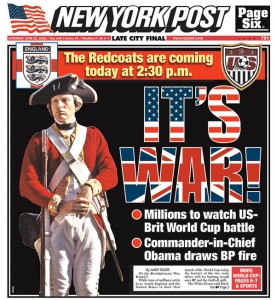
Ah, the New York Post. That bastion of responsible journalism.
I won’t be covering the topic of the intersection of international sports and politics in this article (we did touch on it briefly in the last podcast), but I did want to provide this context for those who may not have been paying close attention to this match.
Now, back to the commercial. I’m most interested in how this commercial compares to the last Dodge ad of note that we Overthought, that misogynistic and creepy Dodge Charger Super Bowl ad:
http://www.youtube.com/watch?v=2RyPamyWotM
Here’s my take: both are trying to exploit male feelings of inadequacy and insecurity, but they go about this in very different ways. The Charger ad does this overtly; in fact, it’s practically bashing the (male) viewer over the head with its images of emasculation. The Challenger ad, on the other hand, exploits those feelings of inadequacy and insecurity more indirectly. This Challenger ad is a response to insecurity about America’s status as both a military power and a soccer power. The former is nothing new; we’ve been insecure about this since the Vietnam War, and it’s not too much of a stretch to read most pop culture displays of American military might as coping mechanisms for getting over that defeat. The latter is pretty obvious as well: Team USA has never been considered a serious contender for the World Cup title, while England is regarded as an international soccer powerhouse. From there, it’s pretty easy to make the Revolutionary War analogy with this soccer match: upstart, underdog America takes on established power and shocks the world.
But none of this is on display in the commercial; it’s all baggage that the typical American male viewer brings with him to the viewing. And as such, it makes it much easier for the view to briefly ignore that baggage, the fact that this muscular commercial is exploiting his insecurities, and just enjoy it at face value.
This is the route that commercials typically take. Of course they’re preying on the viewer’s insecurities. When they’re insecure (e.g., “I have a less-than-cutting-edge phone”), they tend to buy things (e.g. an iPhone) to compensate. But even when they directly address the insecurities, they don’t portray those who harbor such insecurities as pathetic losers who are so desperate they need this muscle car to compensate for their lack of balls. That’s what the Charger Super Bowl ad did, and that’s one of the reasons it got so much attention at the time.

Something tells me that images like this aren't good for selling cars.
Imagine if you took the Charger Super Bowl ad approach and applied to the Challenger Revolutionary War ad. It’d be pretty grim. I’m picturing images of downtrodden soldiers in Afghanistan and replays of past Team USA soccer losses accompanied by a voiceover which basically says, “We may not be winning in Afghanistan or in soccer, but we have this awesome car to sell to you.”
You know, come to think of it, I’d like to see that ad get made. If nothing else, I would appreciate its honesty.
But anyway, back to these commercials. It appears that Dodge is OK with mocking the personal failures of its target audience but steers clear of mocking the failures of the audiences’ country. Which makes sense, given the way that advertisers exploit insecurity for money that I outlined above. “My country isn’t so hot at war and soccer; let me buy a muscular car to make up for that” is much more of a leap for a consumer to make than “my life is boring and emasculated; let me buy an exciting and hyper-masculine car to make up for that.”
[Questions for discussion: What did you think of this commercial? If you’re a UK resident, what’s your take on America’s fixation with the Revolutionary War? Also, isn’t there something deeply ironic about celebrating American cars and freedom, two things which we actually have a pretty bad track record in?]
2. Patrio-f***in-tism
Hey, speaking of “my country isn’t so hot at war,” has anybody else picked up on the phenomenon of singing “America, F*** Yeah” (the theme from Team America: World Police) as a rallying cry for Team USA competing in international sporting events?
(warning: lyrics are NSFW)
http://www.youtube.com/watch?v=sWS-FoXbjVI
I’m sure I’m not the only person who experienced this recently. I was in a rowdy sports bar watching the USA vs. Slovenia game, and during the post-goal celebrations, after the chants of “USA! USA! USA!” had died down, more than one person sang out,
“America!”
To which several people (myself included) responded,
“F*** yeah!”
What’s going on here? My first thought was that this was a way to keep the raging nationalism in check with an ironic little ditty. This makes sense if you read Team America: World Police and the accompanying song as a vicious satire of America’s unilateral foreign policy and the airheaded jingoism that had c0me to pass as patriotism during the run-up to the Iraq War.
But that reading misses the oft-overlooked parts of Team America: World Police that actually celebrate the role of American force in the world, even when it’s unpopular.
(warning: dialogue is NSFW)
http://www.youtube.com/watch?v=b8pAaT4unZc
Likewise, the song “America F*** Yeah” plays both sides of this coin. It’s clearly meant to be satirical and critical of jingoism (“freedom is the only way” is perhaps one of the greatest song lyrics ever written), but given the whole “the world needs assholes” foreign policy advanced by the above speech, it also works as a balls-out celebration of America’s aggressive and often ham-fisted way of getting things done.
In other words, if you’re a fan of America, yet understanding both that a lot of people hate America and that when America gets the job done, it’s kind of messy, then “America F*** Yeah” is actually the perfect song to sing when the World Cup soccer team scores a goal.
I for one hope this trend continues and that teams representing the USA in international competitions start using this song as their entrance music.
[Questions for discussion: has this ever happened to you while watching Team America beat up on the world? Is “earony” an appropriate word to describe Team America: World Police and its attitudes towards patriotism?]
3. Hail to the King, Baby
That’s probably not a realistic wish. I should probably hope for an Elvis Presley song to be used instead, since A) there are far fewer profanities in his lyrics and B) Elvis is the ultimate American pop culture icon, as demonstrated by the USA fans in South Africa who donned the shades and white jumpsuit of the King in support their team:
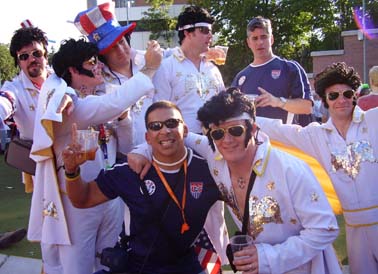
Note: this picture is from the 2006 World Cup, but essentially the same thing was on display in South Africa over the last two weeks.
On one hand, this is pretty obvious. What’s more American than Elvis, right? But let’s stop for a moment and acknowledge how special this actually is. How many other countries have a pop culture icon with so much cachet, recognizability, and sports-appropriate connotations of aggressiveness and power that he’s proudly brought out in international arenas as our representative?
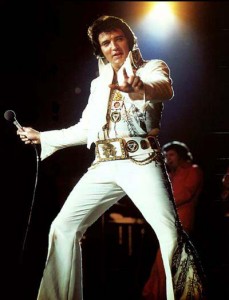
I mean, the guy practically looks like a superhero.
I can think of very few. Maybe English fans could come out dressed as the Beatles, but they don’t quite carry the same aura of agressive manliness that Elvis does.
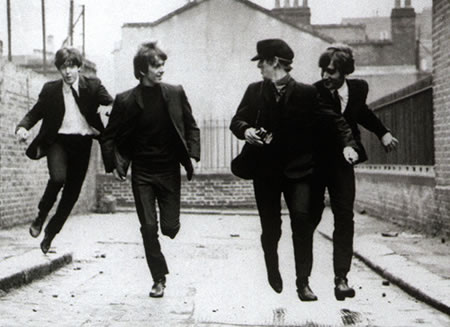
Not very intimidating.
They may match Elvis in terms of international cachet and recognizability, but not in terms of sports-appropriateness. Most of the iconic images of the Beatles depict them as lads from Liverpool, not as übermensch, larger-than-life entertainers. That, and the Beatles’ high tenor voices contrasts poorly with Elvis’ deeper baritone.
Any other contenders from the realm of pop culture? I hate to say it, but the next best iconic entertainer for fans of a World Cup soccer team to dress up as would have to be…
Gerard Depardieu of France.
 America clearly wins in this department.
America clearly wins in this department.
Now, if only we were as good at soccer as we were at, you know, this:
[Questions for discussion: is Elvis an appropriate costume choice for Americans at international sporting events? Doesn’t this suggest that, like Elvis, our team will die overweight, on the toilet, from a heart attack? Who would win in a fight: Elvis in his prime, or the most athletic member of the Beatles in his prime?]
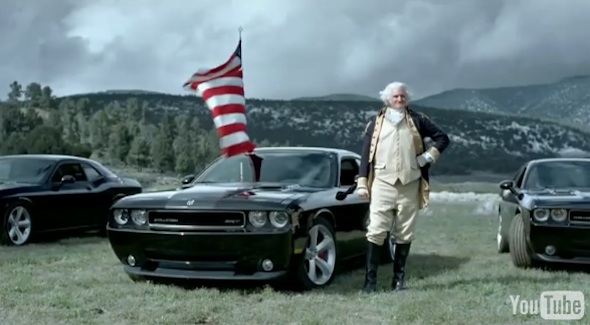
I would hardly say most Americans have a “fixation” on the Revolutionary War. Why, I wouldn’t be surprised if a large portion of the population couldn’t tell you much of anything about said war. It’s really just a cheap media shortcut comparison between the two countries, and if they were really thinking about it, they’d go with the War of 1812 since the US didn’t even win that war.
Technically, Elvis died of a massive heart attack. One likely spurred on by years of prescription drug abuse, but a heart attack nonetheless.
We Americans obsess over the Revolutionary War because, outside of the Nazis in WWII, the British are the last clear enemies of the nation. Nobody remembers the Spanish American War, Al Qaeda , and we can’t use the Vietcong because of the racist implications.
Also, I think the commercial would have been better if, when the Americans start their approach, America F*** Yeah! started with Elvis riding shotgun.
I’m American, but as far as Elvis vs Beatles goes, Beatles win hands down musically. Now if were talking Elvis in his prime vs any Beatle in their prime in fighting, Elvis would kick some Beatle ass.
The Dodge advert I find pretty sick – not because I’m British, and we’re so frightfully upset about losing you guys, nor because I’m just such a fan of the War of 1812, but because we shouldn’t take wars lightly, especially in the way the Redcoats were fleeing there, it felt really unpleasant. Added to this is the fact that our car industry died a few years before yours… and our freedoms were struggling in the War on Terror in much the same way.
Just because the american car industry is being outcompeted, RIGHT NOW, isn’t much ground to argue that the US has a bad track record with cars–historically, the US has pretty much dominated the international car industry.
Let my avatar provide a lot of context. As such, I think the Challenger commercial is made of awesome. Sure, it may be ironic, but it’s also patriotic. I’m a patriot (the kind that loves but questions- think Cornel West) and a sucker for patriotism sometimes, and when it’s aimed at muscle cars, something else I’m rather fond of… well… yeah. I may not be a man, but I totally fall for the Dodge commercials.
Although Timothy, you do make a valid point, and I suppose it *is* rather sick.
Miller or Budweiser or some other beer company made a Fourth of July commercial featuring Washington and Franklin and some hot revolutionary babes partying it up. I can’t find it, unfortunately, but I thought it was pretty funny- they took a comedic approach, messing around and making tongue-in-cheek jokes about the not-so-pristine histories surrounding the Founding Fathers (most blatantly Thomas Jefferson, or “TJ” as their Franklin called him, and references to his debauchery and habits with the ladies). I do remember expecting the beer to be Sam Adams and feeling surprised when it wasn’t. Sort of a kick in the face to them, if you ask me (which you didn’t, but I said it anyway), as if the company that actually made the commercial is saying, “See, you don’t have a monopoly on Revolutionary War figureheads, so neener neener, watch us use those icons for *our* purposes!”
Alsoalsoalso! BBC America has this whole, “British Invasion” thing going on on July 4th, too, being advertised as such. The opening line of text in the commercial I saw was, “The British are coming.” Very tongue-in-cheek.
When in the bars, do people actually sing, “Slavery, f*** yeah,”? I’d hope that line would get changed if, indeed, it played as American sports teams enter a stadium. I can deal with Wal-Mart and stuff, but slavery…? Earony is pretty good to describe _Team America_.
And I’m with dewfish on Elvis v. The Beatles. Why not the King against the Goblin King, though? I submit David Bowie. If the cups he wears in his costumes aren’t hyper-masculine, what is? Sure, he wears glitter- because he’s *that secure* with himself. Elvis wears sequence, after all.
@Chris: corrected Elvis’ cause of death due to heart attack. Thanks for doing the fact-checking I should have done for myself. ;-)
@Valatan: I still call shenanigans on the commercial’s claim that cars are something that “America got right.” Sure, for a long time we were selling the MOST cars, but there are plenty of things about cars that we certainly didn’t get right. American automobile manufactures were way late to the fuel efficiency and safety games. Shoddy management and poor labor-management relations created an unsustainable, unproductive, and uncompetitive unionized workforce. And perhaps worst of all, our infrastructure planning around cars has cost us dearly in terms of lost urban spaces, gutted mass transit, pollution, and addiction to oil.
If America “got cars right,” we wouldn’t have had to bail out GM, we’d have less cars on the road to begin with, and maybe, just maybe, we wouldn’t have a massive oil spill in the gulf.
And don’t get me started on America “getting freedom right.”
SLAVERY
F*** YEAH!
Speaking of which:
@Gab: the singing didn’t get past the “America, F*** Yeah!” call-and-response.
Oh, Lee, you make me lol far too often.
I’d add
GENOCIDE
F*** YEAH!
given one portion of my ancestry and the history entailed there.
I thought Elvis’s heart attack was an accumulated thing because of all of the drugs, like Chris Farley or John Candy. Sure, it was a heart attack at that moment, but his heart had been stressed quite literally to its breaking point by the years of substance abuse.
@lee
Note that I didn’t say a word about the freedom. That would be a complex issue to even begin to delve into.
As for the auto industry, really comparing the Japanese and Korean manufacturers arrangement to ours is a very complex issue given the syndicalism in East Asian governments. There just isn’t the same public/private distinction there–talks of loans and bailouts are far more complicated.
Furthermore, the labor relations you cited originate from the UAW trading away pay for benefits in the early ’80s. It’s hardly the fault of either the UAW or the big three that the top level policymakers in the US decided to create a health care system that made any high-end health care plan unsustainable.
And, you know, the ad didn’t claim that ‘America got urban planning right’
DENMARK…
F*** YEAH
Since the World Cup is in South Africa, could they claim Nelson Mandela as their “iconic pop culture icon”? He’s certainly iconic, and he was recently the leading character in a sports movie, so that’s relevant pop culture. I’m not really sure what the costumes would look like, and that’s really the key for Elvis’s popularity: the fact that he’s got such a distinctive look that he’s easy to imitate and be recognized.
btw, isn’t “iconic pop culture icon” redundantly redundant?
@Mark: yeesh, I wrote that? Corrected. Thanks for pointing out that mistaken mistake.
@Valatan: yeah, I know I’m stretching the definition of “getting cars right.” I just wanted to use this an excuse to go on a mini-tirade on cars. Blah blah blah, I live in New York and believe in mass transit and bikes, blah blah blah. ;-)